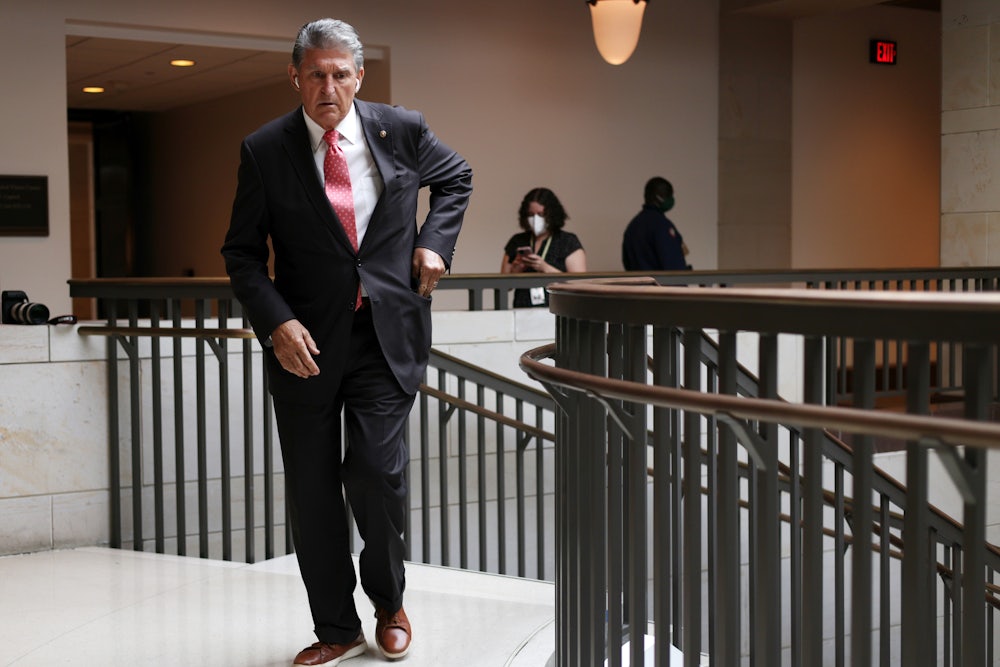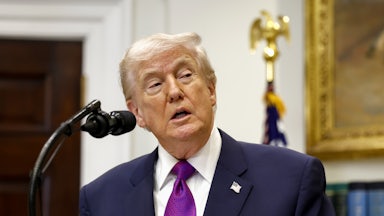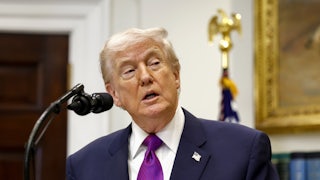Lots of ink has been spilled this year trying to figure out what makes West Virginia Senator Joe Manchin tick. Is the Senate’s crucial swing voter a Machiavellian political genius out to save the Democratic Party from itself, or just a media gadfly enjoying his moment in the sun? Is he fighting for his legacy and the interests of West Virginians that national policy leaves behind?
Manchinology is back with a vengeance this fall, now that the senator has announced he may not cast a deciding vote in favor of the Democrats’ $3.5 trillion budget reconciliation package, and instead wishes to delay voting on it until 2022. The spending measure is vital, not least because it could represent America’s last best chance to pass something resembling climate policy for at least a decade. So Manchin’s latest hairpin turn attracted attention. Since his declaration, a piece in National Review has praised what it saw as his fiscal instincts and willingness to stand up to fellow Democrats. A Brookings blog post argued that “his main concern that additional deficit financed spending adds to inflation risks is not unfounded.” A former adviser suggested to The Washington Post that Manchin is fundamentally mysterious and his vote is impossible to predict.
Joe Manchin, though, made half a million dollars last year off his son’s coal company, meaning that coal paid him roughly three times the $174,000 salary he made last year as a public servant. Pundits don’t need to look much beyond that to understand what’s driving him.
Despite all the armchair psychology, the best evidence we have suggests that Manchin tends often to act as a vessel for his considerable financial interests in the fossil fuel industry. As Daniel Boguslaw reported for The Intercept earlier this month, Manchin has earned more than $4.5 million from Enersystems Inc. and Farmington Resources Inc., two coal industry companies he founded in the 1980s. That’s not to say Manchin isn’t also bloated with a jumbled mess of microwaved ideology about fiscal responsibility and compromise. He probably likes all the attention he’s getting, too. Maybe he fancies himself a champion of the forgotten man. But if on a given day you are trying to understand what Joe Manchin’s priorities are, it’s probably best to look to the priorities of the companies he’s gotten money from.
In June, Exxon lobbyist Keith McCoy told the Greenpeace investigative outlet Unearthed that Manchin was among their key targets and participated in weekly meetings with company operatives. Overall, though, he’s received more donations from coal, oil, and gas companies this campaign cycle than every other senator. Asked by Unearthed’s undercover reporter whether Exxon was trying to keep a clean energy standard out of the infrastructure package, McCoy said, “not really,” since if such a policy were included, “we would probably advocate for natural gas, and I think that is taking hold. We think natural gas would play a key role in anything and not just as a bridge fuel, we think it’s a low emission energy source and should be part of a clean electricity standard.” Manchin got $10,000 from Exxon Mobil for his 2018 reelection campaign. His top donor so far for the 2022 cycle is Tellurian Inc., a gas company.
The senator’s office did not respond to a request for comment on this piece. In response to The New York Times’ piece on his fossil fuel industry ties published on Sunday, a spokesperson for Manchin said the senator “is in full compliance with Senate ethics and financial disclosure rules. He continues to work to find a path forward on important climate legislation that maintains American leadership in energy innovation and critical energy reliability.”
Manchin has also denied the weekly meeting allegations in the Unearthed report. But according to the Times’ reporting, he’s working to ensure that the bill’s $150 billion clean electricity measure—the Clean Electricity Performance Program—will “protect and extend the use of coal and natural gas.” His version, now in the works, will reportedly “reward utilities that build new power plants designed to burn natural gas” and remove proposed fines on utilities that don’t meet clean energy goals. Manchin’s not the only one who seems to be close with fossil fuel interests, though. Investigative outlet Sludge found in 2019 that U.S. senators combined own as much as $14 million worth of fossil fuel industry stock.
Voting with your wallet is nothing new in Congress. Long Island Congresswoman Kathleen Rice—who beat Alexandria Ocasio-Cortez for a post on the Energy and Commerce Committee—joined fellow Democratic Representatives Scott Peters and Kurt Schrader last week in voting against a provision that would have allowed Medicare to negotiate with pharmaceutical manufacturers over the price of prescription drugs. The policy is a longtime Democratic priority and ostensibly welcome news to fiscal conservatives concerned about the cost of government programs; lower drug costs could represent $700 billion in savings. As the Daily Poster reported, though, the trio have received a combined $1.6 million in donations from pharmaceutical and health care products companies. Kyrsten Sinema, who campaigned on lowering Medicare drug costs, has said she opposes the plan as well. She is one of the Senate’s top recipients of campaign contributions from pharmaceutical companies.
Such contributions are, of course, par for the course in the United States. But it’s not unreasonable to suppose that they have certain political effects: for example, rendering representatives slightly less concerned about the suffering of constituents who aren’t members of the Chamber of Commerce. Business as usual has been good to the country’s biggest corporations. If it stays in place, it can be good for their favorite politicians, too, whether any infrastructure spending happens or not.
Politics can be ego-driven as well as cash-driven: Lots of lawmakers, after all, just want to guard their piece of the congressional sandbox and yelp whenever prestigious committee posts or credit for a Dear Colleague letter appears threatened. But money certainly talks in Washington, and the kind coming to Joe Manchin from the fossil fuel industry appears to be screaming out against meaningful climate policy.




